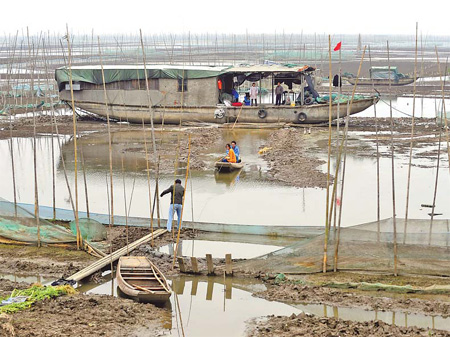Economy
Severe drought drains farmland and fish ponds
Updated: 2011-05-26 13:00
By Zheng Jinran (China Daily)
|
 Fishermen use a ferry to cross a shallow water pool in Honghu Lake in Central China's Hubei province on Tuesday. [Photo / Xinhua] |
Young workers forced to leave villages to find employment
CHANGSHA - Fishing boats and farmland have been left desolate in the drought-hit areas along the middle and lower reaches of the Yangtze River, inflicting huge losses on farmers.
"About 70 percent of young men in the village have left to work elsewhere," said Gong Zemin, a farmer from Huangni village in Central China's Hunan province. Most of the village's residents plant cash crops or raise fish in ponds.
Recent rainfall has slightly raised the water level of Dongting Lake in the northeastern part of the province.
"Thanks to these rains, the drought around the lake has been relieved to some degree," Chen Sihai, vice-mayor of Yueyang city in Hunan, told China Daily.
| ||||
But areas far from lakes and the Yangtze River are still suffering from the lingering drought.
"We cannot make any money from our dried-up ponds this year. What's more, we have to carry water from 3 kilometers away for drinking. So more and more people want to work outside," Gong said. About 70,000 people were short of drinking water in Meicheng county, where his village is.
The ongoing drought will continue for the coming week throughout southern regions such as Hubei, Jiangxi and Jiangsu provinces.
Yang Lijuan, a resident in Hanchuan county, near the Hanjiang River, a major branch of the Yangtze River in Hubei province, said the dry spell this year has ravaged her cropland and left her no choice but to sell fruit in the provincial capital of Wuhan.
"The weather is too bad this year. If I stay in my hometown and plant crops, I won't be able to support myself, let alone my family."
Mu Sanhai, 53, a fisherman who has 5.3 hectares of ponds in Chengzi township in East China's Jiangxi province, had to work at construction sites to make money, since half of his fish died.
"Every day, about 500 kg of my fish would die. I was so sad. But there was no water," he said. "All of my savings have dried up like the ponds."
Feng Zhiwei and Zhou Lihua contributed to this story.
Specials

Suzhou: Heaven on Earth
Time-tested adages sing praises of Suzhou, and Michael Paul Franklin finds it's not hard to understand why on a recent visit.

The sky's the limit
Chinese airline companies are increasingly recruiting pilots and flight attendants as the industry experiences rapid expansion.

Diving into history
China's richest cultural heritage may lie in the deep, like exhibits in a giant underwater museum.



